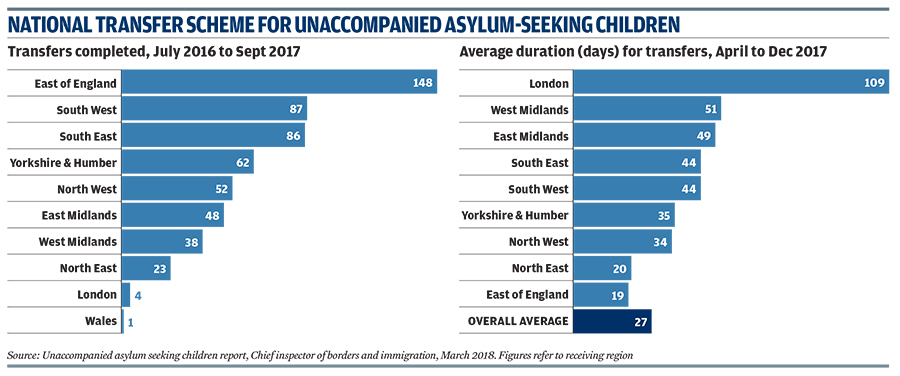Delays undermine asylum transfer scheme
Derren Hayes
Tuesday, April 24, 2018
Campaigners back inspection report that shows funding and capacity concerns are delaying transfers of unaccompanied children.

An inspection of support arrangements for unaccompanied asylum-seeking children has identified problems with the system used to transfer children from the care of one local authority to another.
The review by the Independent Chief Inspector of Borders and Immigration found that the Home Office-run National Transfer Scheme - used to disperse unaccompanied children evenly around the country - is broadly succeeding.
Established in July 2016, it was set up to relieve pressure on so-called "gateway" authorities, such as Kent and Hillingdon, that were having to care for large numbers of unaccompanied children entering the country via ports and airports.
According to Home Office data, in the first 14 months of the scheme, 549 unaccompanied children were transferred from a gateway authority into the care of another. Authorities in the East of England received by far the most cases, followed by the South West and South East (see graphics).
However, the inspection highlighted problems with the scheme that were having a negative impact on the care and outcomes of children. The most significant of these was the time it was taking for transfers to happen. When the scheme commenced, transfers were taking eight days on average, but by December 2017 this had risen to 27 days (see graphics).

Rise in delays
All regions reported a rise in the average number of days it took to complete transfers in the last three months of 2017/18, suggesting the problem is deteriorating.
The inspection report outlines how delays in transfers taking place can affect a child's access to education, support and legal advice, and make it harder for children to settle successfully in the country.
Dinah Beckett, regional co-ordinator at Migration Yorkshire, one of the 10 regional strategic migration partnerships that monitor and co-ordinate migration across regions, says the longer a child stays in the "entry" authority, particularly if it is in London, the harder it is for the transfer to happen.
"If they are in London for a couple of months, they may have started school or college and be living with a foster carer - many don't want to come," she says. "The number of successful transfers where children have been in London for a long time is pretty low."
When a child stays in an entry authority for two or three months, there is a greater likelihood of them going missing when they are told they are being transferred, the report states. It cites figures from a previous report published last October that shows 31 children had gone missing during the process.
"We have had a few cases where children have gone missing on the day they were due to transfer," says Beckett. "The social worker has turned up to collect the child, but they are not there."
Beckett says children who abscond are at greater risk of being exploited or trafficked by organised gangs, reinforcing the need for transfers to happen quickly.
The report states that some children have resorted to taking legal action to stay in their entry authority because lengthy delays to a transfer have seen them start to build a life there.
Judith Dennis, policy manager at the Refugee Council, says the entry authority needs time to ascertain whether the child has any relatives or connections already in the country, but that transfer should be requested soon after that.
Dennis says a recently revised version of the transfer guidance is clearer about entry councils' responsibilities to review the decision to transfer if there are lengthy delays.
"Delays may be caused in part by receiving local authorities wanting to make sure they have the right services in place before receiving a child. They need to understand the impact of delays on a child's care, so have to be realistic about what can be planned for," she adds.
Lack of capacity
Under the scheme, each council that opts in is expected to take on unaccompanied children up to a maximum level of 0.07 per cent of its overall child population.
However, 40 per cent of councils are not participating, the report reveals. Some say pressures across the care system mean they do not have the capacity to do so, while others point out that Home Office funding only covers around half the cost of supporting a child.
"Funding levels are insufficient and the system is dependent on the good will of authorities," says Beckett. "Some councils see it as their obligation to take children, while others have looked at their budgets and demands and decided not to participate."
Funding rates
She adds that the Home Office is currently reviewing the scheme's funding rates, "but recent conversations with officials have been about managing expectations".
Dennis is more optimistic that the funding review will result in more resources being provided. She says upfront funding is needed to ensure there are sufficient school places, foster carers and support services for unaccompanied children.
"I think the government will say to councils ‘tell us what you need to improve placement capacity'," she adds.
In addition, the recently announced extension of the transfer scheme to the rest of the UK should help relieve pressure on English councils.
FURTHER READING
- Inspection of how the Home Office considers the best interests of unaccompanied asylum seeking children, Chief inspector of borders and immigration, March 2018
- Government response to the inspection, Home Office, March 2018
- Revised national transfer scheme protocol, Home Office, March 2018




